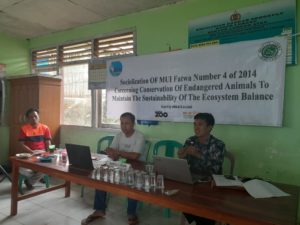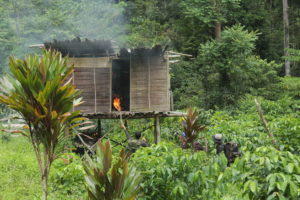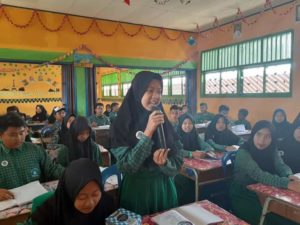Lingkar Institute’s recent interim report tells of its activities working in communities in Benkulu, South Sumatra, where they are using wildlife and Islamic values and perspectives to build conservation awareness. During the first six months of the project, the team have been carrying out local engagement with community leaders and patrols in the surrounding forests.
Three workshops took place in local villages, targeted because it was known that several hunters lived there. These may not be tiger hunters, but anyone hunting prey animals are targets because of potential food loss for the local population of Sumatran tigers, potential conflict with those same animals and of course flouting National Park laws. During the workshops the Lingkar team in cooperation with the Indonesian Ulema Council of Lebong and North Bengkulu Districts, talked with the communities about the MUIs FATWA (2014) against the hunting and killing of endangered wildlife. These events not only remind hunters that it is again Islam to hunt and kill tigers but also gives the team a reason to engage with local people. It is resulting in information gathering about poachers and leading to tip off about snare placements.
Acting on intelligence gathered during one of these sessions in Pelabai village, the Patrol team succeeded in finding 11 prey snares in the form of nylon ropes. Besides prey snares, they also found a former hunter’s pole for hanging/skinning prey animals.
Other actions included destroying a squatters’ huts that had been deep inside the Kerinci Seblat National Park area.
The team also visited a local Junior High School, where the staff and pupils are already making changes to their lives to protect the environment. The report tells that:
“The Junior high school is very concerned about environmental education and the school has a rule which against buying food and beverage packaging that caused the rubbish. All students and teachers were required to bring drink bottles from their homes. Each student and teacher is also required to plant a tree to be planted in the school environment or outside the school environment.
Before this regulation compliance, every activity in the school would cause much rubbish, but nowadays, because of the students’ and teachers’ awareness, there is no longer any visible rubbish in the school environment.”
Two National Park officers, the MUI Lebong officer, and a person from the Lingkar Institute talked to 50 students about the importance of protecting the forest along with the plants and animals inside, especially those in Kerinci Seblat National Park, an explanation of the laws and regulations which was focusing on the forest, the animals and plants inside. The MUI officer talked about wildlife and Islamic values andexplained that there was already MUI’s Fatwa No. 04 of 2014 which forbade the hunting of endangered animals. The Lingkar Institute explained how conservation education will be integrated into the school’s education curriculum as students are “the next generation who are expected to maintain the balance of the existing ecosystems on Earth”.
You can help us fund this project for another year. Please donate now to our tiger fund.

National Park and Muslim Council leaders talk to villagers © Lingkar

Squatters hut inside Kerinci Seblat National Park destroyed © Lingkar

Engaging with school children © Lingkar

